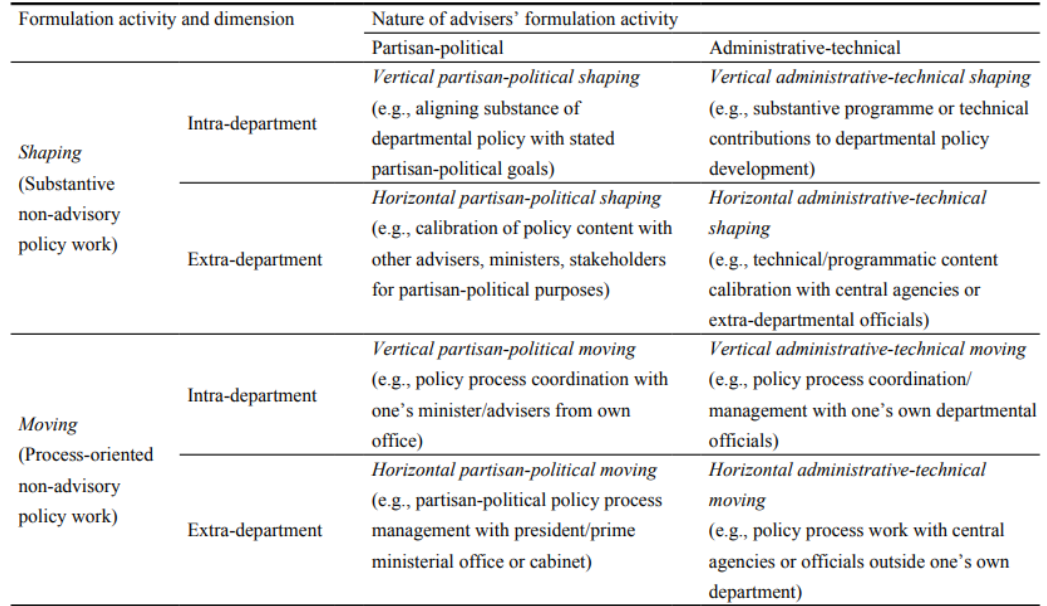A chapter in a handbook on ministerial and political advisers discusses the policy work of advisers. In some instances, they pen key speeches or are involved in determining the parameters of key policies and programs. They are often sounding boards for elected officials and at times even senior officials or key stakeholders. Advisers can also be problematic, overstepping appropriate boundaries and interfering with departmental administration.
When examining the policy work of partisan advisers, advisory and non-advisory policy process contributions need to be considered. Policy work beyond formal policy development includes:
- policy advice provided before or after formal policy development where issues are sifted and sorted
- the relational work of engaging with other policy actors within and outside of government in the context of policy issues
- the ongoing policy functions of advisers in relation to policies that have already been implemented or are on the horizon
- governance activities linked to policy.
The chapter uses the concepts of buffering, bridging, moving, and shaping as part of a framework to depict and analyse advisers’ policy work. It also considers advisers’ policy activities along two dimensions:
- substantive which focuses on content
- procedural which focuses on process.
Substantive work is linked with formal policy development such as developing policy ideas, calibrating policy as it is being developed or involvement in implementation and evaluation. It also includes engaging on policy matters with ministers, senior officials and external stakeholders.
A policy advisory system is a collection of advisory units and practices with which governments and other actors engage for policy purposes. Within this system, ministerial advisers are accepted partisan-political actors who are brought in by ministers to provide a political lens to policy work.
The ability of ministerial advisers to engage in partisan-political aspects of policy work makes them unique. They are also unique in that they often are boundary-spanning policy actors who can also engage in administrative and technical forms of policy work. They interact with a range of non-partisan public servants, as well as other policy actors such consultants, expert and other stakeholders.
Table 1 shows the work of advisers along content and process dimensions, as well as its partisan-political or administrative-technical nature.

Table 1: Conceptualising advisers’ policy advisory activity
Bridging helps identify policy advisory activity that does not involve developing content-based policy advice. It captures policy advisory activity where partisan advisers integrate or exclude other sources of policy advice. Bridging can involve the integration of partisan-political policy advice other ministerial offices or centres of government. Bridging can also serve to block or ‘gatekeep’ policy advice intended for ministers. Advisers – at times at the behest of ministers and other times without their direction – filter or block advice, (often from public servants) to prevent it from reaching ministers.
The notions of moving and shaping help to depict advisers’ policy work beyond what’s tied to policy advisory activities. Table 2 illustrates this work along the process/substance and partisan-political/administrative-technical dimensions. It also includes intra-departmental and extra-departmental dimensions to take into account the relational nature of the work.

Table 2: Ministerial advisers’ non-advisory policy work
Substantively, ministerial advisers may engage in policy work that is being developed in both the formal policy development process of the public service and the political machinery of government. In other instances, shaping is more partisan-political where advisers apply a political lens to policy development work. There are also other activities that fall under partisan-political. Advisers support ministers in the delivery of their assigned priorities, ensuring that ministers respond well to unexpected policy and political matters. They also support cabinet processes and can play a whole of government function in supporting the government to advance its political agenda.
Advisers engage in diverse policy work to support of ministers and cabinet government. Advisers’ policy work is in part a product of the prime minister, minister, and the particularities of the political or policy context at hand. In some cases, advisers are highly active policy players while in others they are constrained or even marginal. Advisers may engage with policy development via formal processes, while in other instances their engagement is less formal and more ad hoc. Their policy work can be confined to advisory activity or extend to a range of non-advisory policy work.
While the traditional dominance of advisers is at the front end of the policy cycle (setting agendas and contributing to formulation and decision-making), there is evidence that advisers can also be active downstream in implementation and evaluation given the growing interest in the delivery of policy.
Want to read more?
Ministerial advisers and policy-making by Jonathan Craft in Handbook on Ministerial and Political Advisers, Richard Shaw (ed.), Elgar Online Publishing, May 2023
Each fortnight The Bridge summarises a piece of academic research relevant to public sector managers.